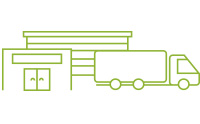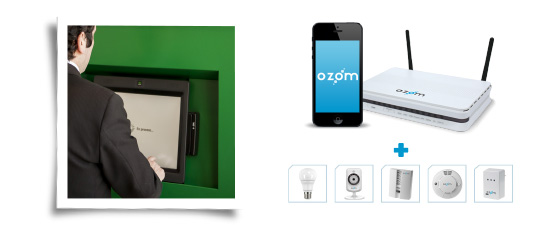
Profitability
"The Click & Connect service is available at every department store in Chile, Colombia, Argentina, and Peru, which allows the customer to make purchases online and retrieve those products from the store of his or her choice. "

For the Falabella Group, it is not enough to simply grow. Growth must go hand in hand with the continual improvement of the Company’s operations in each of its business divisions. In 2014, the Company reported US$4,394 million in gross profits, a 13.7% year over year increase, while EBITDA reached US$1,674 million.
The Group is implementing a series of initiatives that aim to provide its customers with a consistent level of service, no matter the time or place, through its various sales channels. These initiatives will be rolled out across the region. For example, in 2014, Falabella, provided sales people in Chilean stores with tablets connected to the internet, allowing in-store access to the full range of products available on the Company’s websites, complementing the product mix available on the sales floor. Additionally, the Click & Connect service is available at every department store in Chile, Colombia, Argentina, and Peru, which allows the customer to make purchases online and retrieve those products from the store of his or her choice. This service was also implemented in some Sodimac and Tottus stores in Chile. The Click & Collect service not only improves the customer’s shopping experience and reduces delivery times, but it also simplifies the logistics of ecommerce since products are dispatched to the store from the distribution center or, when possible, the order is simply fulfilled using in-store inventory.
Regarding productivity, the Group continues implementing the LEAN management model. Throughout the business, focus is placed on increasing production efficiency, reducing operational tasks, reducing processing times in distribution centers and increasing efficiency in in-store reception and restocking tasks, as well as in optimizing the distribution of the Company’s staff. Several department stores were remodeled in order to optimize the use of space, centralize check-out counters and renovate the look of different departments. In Sodimac self-service check-outs are being implemented, with the roll out complete already in several stores. In Tottus, in the production center of confectionary and prepared foods, processes were standardized in order to reduce production times. Additionally, 11 stores in Chile and two in Peru were remodeled in order to optimize the sales floor, in order to introduce new categories and improve the existing product mix.
Given the growth that the Group has experienced over the past years, the Company is developing several infrastructure projects that will allow it to leverage its future growth in the region. In 2014, Tottus’ new dry goods distribution center in Lima began operations. This first stage of the distribution center has a total surface area of 34,000 m2.
"In 2014, Tottus’ new dry goods distribution center in Lima began operations. This first stage of the distribution center has a total surface area of 34,000 m2."

Special attention is being placed on the systematic technological advances that are revolutionizing the consumer habits of the region’s population. In this context, Falabella Financiero began in 2014 a series of technological projects that seek to innovate payment methods, develop omnichannel customer service, optimize risk engines and adapt centralized systems for credit cards and other banking products. The implementation of these projects should generate operational efficiencies and improve the customer’s satisfaction and experience through better service. Additionally, special emphasis has been placed on capturing new customers in order to reduce funding costs, by promoting the direct salary deposit program. Accounts with direct salary deposits increased by 58% in the region, thanks to this initiative. Meanwhile, the Group continued to incentivize customers to migrate to remote service options. As a result, in 2014, 82% of all customer services were handled through self-service channels and 47% of all customers received their account statements by e-mail. For its part, Banco Falabella Colombia began installing its own network of ATMs, with 46 points of service operational by year end.
The development of private label brands is crucial, both because this strategy enables the Group to offer customers product options with a better price/quality balance and because it increases profitability. During 2014, the Group launched two new private label brands. Wurden, a small home appliances brand, characterized by its high level of efficiency, performance and technology, with a wide range of products suited for today’s lifestyle, with innovative and quality designs. This brand will be available across the Group’s three retail formats, optimizing its production and distribution. In the same year, Sodimac launched the Ozom brand, a new home automation technology. Ozom’s product line is comprised of twelve products that allow customers to remotely control their homes through a mobile app. Functions include turning lights on and off, as well as operating cameras, locks and sensors, among others.
In the real estate business, the concern for achieving greater profitability was reflected in a greater efficiency in the use and maintenance of equipment, a greater centralization of the services shared among shopping centers across three countries and in the optimization of marketing expenses.



